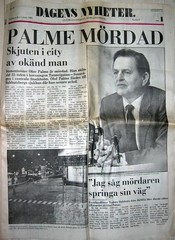I sat the last two days in a seminar by the Nordic Culture Fund on diversity and Nordic cultural work. On the last day we ended up in a heated debate in our workshop on whether being Nordic is an identity and how does that come together with goals of inclusion and integration.
I said first in the discussion that I would see the Nordic countries rather as a natural area of collaboration rather as an identity with historic routes. The ethnic-cultural-historical argument for the Nordic countries easily stands in the way of true equality and integration. The links are obvious to those Europeans who claim that we share the same values and a history.
I realised towards the end of the seminar that my idea of the Nordic region was something special and I feel parts of it can be explained through the Finnish language. I realise that I have grown up with an idea of the Nordic region as something where peace and justice prevail. This is something I picked up from school, not that much which country oppressed which Nordic country at which time and who really had the vikings.
I was brought up with the idea that the Nordic identity and aspiration can be explained through actions of people like Anna Lindh, Olof Palme, Martti Ahtisaari or Hans Blix. That Finland was on its way to being Nordic. That Nordic means also peculiar people who do not fit to all conventions and who dare to touch our sensitivities like Tove Jansson, Lars von Trier or Ingmar Bergman. That Nobel Peace Prize illustrates Nordic actions by Nordic and non-Nordic people. That being Nordic means believing in the human being, having a clear sense of ethics, trusting your neighbours (passport-free border-crossing for ages) and working for the benefit of mankind. That here in the North we give from our own when we have enough. That Nordic is something we need to work for - hard. And more often than we would like to admit, we we fall short in living up to those noble ideals. That Nordic is not a state of being, it is a responsibility for action. And that of course we should not claim to own this package of ideals but that the combination of them makes our life up in these circumstances worthwhile.
I wonder if this articulation of the Nordic identity could also function as a tool for integration and inclusion. It may sound slightly naive but it gives me a sense of direction and a reason for optimism. In term of integration we wound need recognise those beautiful ideas, make concrete the individual and societal work needed to make our way towards them and be honest about the shortcomings in terms of greed, protectionism and selfishness. Of this we have a tremendous amount of examples from the last 20 years.
That we would consciously shift our focus to what we can become at our best and to our personal responsibility rather than obsessing over a shared past. The Nordic Dream seen here would be very different from the European or American one.
Mitä Euroopan pitäisi nyt tehdä
2 days ago













No comments:
Post a Comment